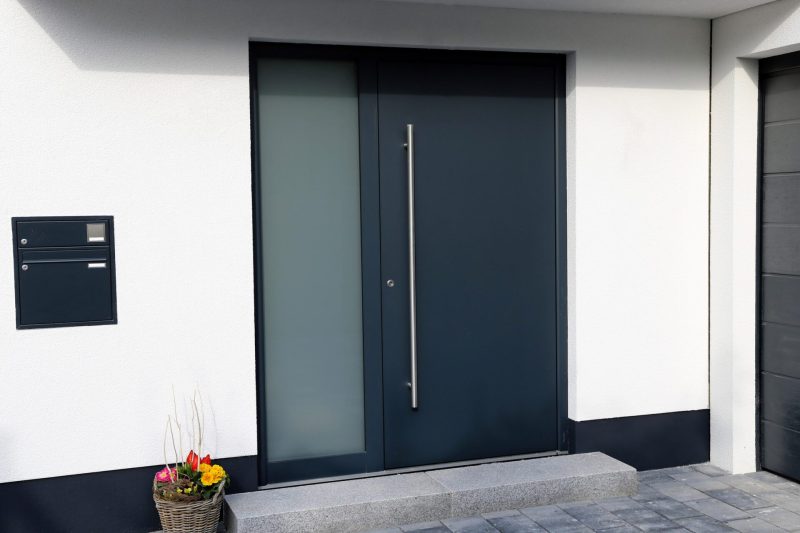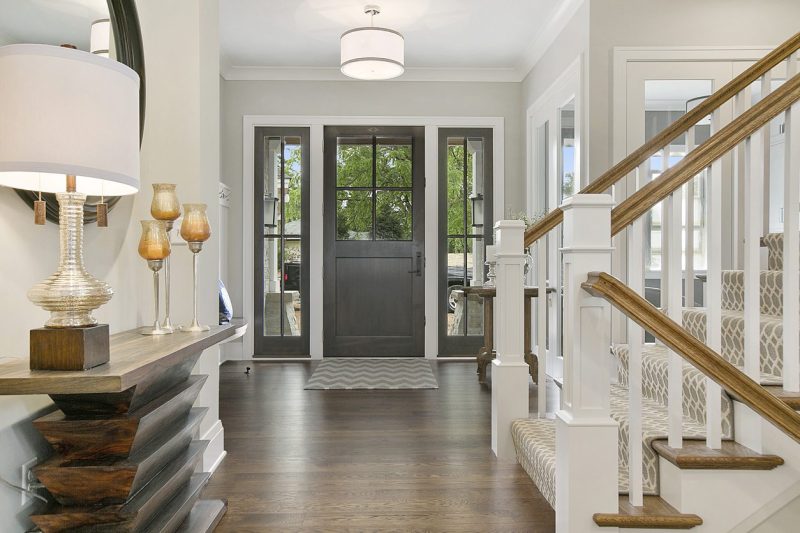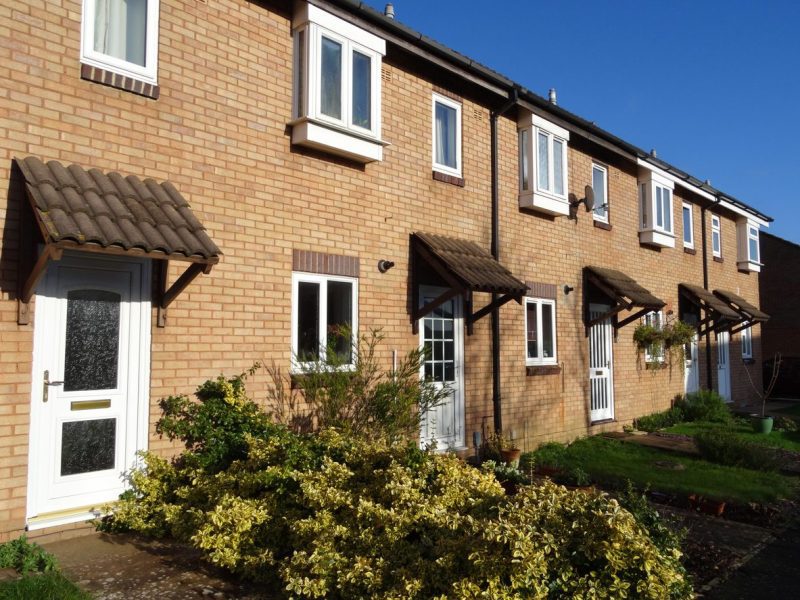Many homeowners looking for new doors are often torn between uPVC and composite doors. There are some key differences between them that could help you make your decision on which material is right for you and your preferences for your home. In this article, we will break down the key features and benefits of both uPVC doors and composite doors below so you can get a better understanding of the differences between them before making your decision.
uPVC doors are solely made from plastic, composite doors on the other hand are manufactured from multiple different materials that are compressed and glued together in high-pressure conditions.
Composite doors beat uPVC in terms of thickness at 44mm compared to uPVC with 28mm. A good quality composite door can be produced from superior materials making them strong, durable, secure, and weather resistant to name just a few benefits.

In recent years composite doors have been posing more of a competitive threat to uPVC doors. They have developed a strong presence in many family homes around the country and are slowly becoming the overall ‘door of choice’. Prior to this, uPVC doors were the most popular due to their affordability, attractive appearance, and easy maintenance with little cleaning needed.
These qualities are still important factors and uPVC isn’t completely out of favour by any means. The more detailed comparison below should help you get a fair idea of which one is better for you and your property in this ‘battle of the doors’.
Energy efficiency
A lot of homes around the UK lose heat and money every year due to old, or badly fitted doors, older designs or methods of installation allowed doors to lose strength or shape leading to gaps where cold air can get into the home and warm air escape. This also leads to damp or black mould around the door frame and surrounding areas because of the hot and cold air meeting inside your home resulting in condensation and eventually dampness.
Modern uPVC and composite doors can stop valuable heat from escaping your home and stop cold air from entering which will prevent condensation. uPVC door frames trap the heat inside by reducing air gaps. The design is highly practical and prevents unnecessary heat loss whilst regulating the temperature in your home.
Composite doors offer a similar design that aims to stop draughts and prevent dampness from occurring in your property. The main advantage you will get with composite doors is the solid timber core, which is covered by a uPVC and GRP coating, resulting in a stronger and more thermally efficient solution.
Robustness
It is widely assumed that uPVC doors are the most durable on the market. Whilst they do have impressive levels of durability in comparison to other materials like wood, they don’t quite meet the standard of composite doors. uPVC doors have always been and continue to be very easy to clean and maintain. However, up to five years can be lost from the life of a uPVC door if you don’t keep up with the minimal maintenance routine. A composite door can stand strong for up to 35 years and 33 years of this can be without any type of maintenance at all.
Security
Due to their combination of materials, composite doors are two times thicker than uPVC, and their polyurethane core ensures it is rock solid. Therefore, when it comes to security, composite doors are highly effective in making sure your home is fully protected from any potential intruders. Also, the strength and durability of these doors provide complete weatherproofing which is especially useful if you live in an area that experiences more adverse weather conditions.
Technological developments over the years have seen the quality of uPVC production increase significantly, making them much more secure today than they were in the past. They are likely still to be the most affordable and value for money doors on the market, considering the high quality you get in security and other benefits for the price. If you are on a strict budget, uPVC doors should certainly be a top contender for you.
Range of choice
Both uPVC and composite doors have a wide variety of colours available, meaning you won’t be short of options no matter which material you go for. Some owners might find that uPVC fades slightly over time which can affect the look of the door, but this is fairly minimal. The colour and design ranges in both materials are so broad that you are sure to find the right combinations that will suit the look and style of your home.
Value for money
As previously mentioned uPVC doors are one of if not the cheapest materials on the market, making them extremely cost-effective for those with a limited budget. Arguably, they might not be as efficient as composite doors but the value for money they offer cannot be denied.
Composite doors, despite being a bit more expensive, will also give you value for money when you consider the high standard they provide in each benefit, including their energy efficiency, strength, and longevity. You might pay a little more for composite doors, but you are sure to get the value out of them for many years.
Appearance and style
Whether you are looking for a front door or back door, appearance is important. It wouldn’t be any good having doors that didn’t suit the style or overall aesthetic of your home at all. There is scope for flexibility in both door materials, the option of wood grain finishes, for example, can be a good fit for more traditional homes.
Composite doors likely get the advantage here as the amount of detail that can go into the look of your door will guarantee you get the exact appearance you want for your home, no matter if it is an old period property or a super modern new build.
What is the price difference between uPVC and composite doors?
The most noticeable difference in price between these two types of doors is their initial costs without considering the value the new door will add to your home. Typically, a basic uPVC door would have a price tag of roughly £600, depending on the size, door furnishings, colour, and glazing choices. Also, there are a lot of extra features like door handles, doorbells, house numbers, letterboxes, spyholes, knockers, and dog or cat flaps, that can all add to the overall price.
A standard colour (blue, black, white, etc) composite door is normally more expensive, with prices beginning at about £1,000 for an entrance door. It is worth keeping in mind, however, that a uPVC front door would be closer to this price than a basic door for any other part of your house. For instance, a back door would be cheaper than a composite front door.
As we have seen, a uPVC door is about £300-£400 cheaper than a composite door initially, depending on the extras and position of the door. Ignoring this initial investment, a composite door will be a better investment in the long term, as it will increase the value of your home and save you a significant amount of money on your energy bills.
You can lower the cost of both uPVC and composite doors by going through all the options available to you with our team at Clydebuilt. We will make sure you get the best price and overall customer service when getting your new doors from us.
Door lifespan comparison
| Door type | Predicted lifespan | Maintenance |
| Softwood door | 20 years | Paint every 4 years |
| Hardwood door | 30 years | Paint every 5 years |
| Steel composite door | 30 years | Wipe clean |
| PVC composite door | 30 years | Wipe clean |
| GRP composite door | 35 years | Wipe clean |
| uPVC panel door | 20 years | Wipe clean |
A summary of the differences and which material is right for you
Both uPVC and composite doors essentially offer homeowners the same benefits, it is simply that composite doors do them a bit better than uPVC. uPVC is still ahead when it comes to price and ease of maintenance, which will always ensure their high position in the popularity list of door materials.
However, if those looking for a new door are wanting to spend a little bit more money for a higher-performing door when it comes to energy efficiency and durability then composite is the right choice for you. They are typically more attractive and will add to the overall look of your home, thanks to the variety of options that can be tailor-made to your exact needs.
Composite doors are quick and easy to maintain and not expensive to look after in the long term. Little maintenance is needed consisting of an occasional wipe over and oiling of the hinges from time to time.
Ultimately, your personal preferences will be the most important thing when deciding whether you should choose uPVC doors or composite doors for your home. It will depend on which features, and benefits are most important to you.
FAQs about uPVC and composite doors
How much does a standard uPVC and composite door cost completely fitted?
A fully installed uPVC door would normally cost £600 based on the style of the door, the types of features chosen for the door, the area your home is located in, and which country you select.
A standard composite door fully installed would come with a price tag of £1000 depending on the style of the door, the types of door hardware, the style of glazing you choose, and the company you go with.

What is the difference between uPVC and composite doors?
The main difference between uPVC and composite doors is the materials used in the production of the doors. uPVC doors are solely made up of uPVC (Unplasticised Polyvinyl Chloride) low maintenance plastic. Composite doors are manufactured from a combination of hard-wearing and thermally efficient materials such as solid timber core, GRP (glass reinforced polyester) coatings, and a uPVC frame. Due to this variety of materials and manufacture, composite doors, even though more expensive, are typically more popular thanks to the strong, long-lasting structure.
Are composite doors better than wood doors?
A GRP composite door has all of the positive features of a timber door without any of the associated negatives. This composite door will last considerably longer than a wooden door with practically no maintenance. Also, it is very customisable with several long-lasting colours available, a wide range of door furniture helps homeowners create a style that suits their unique taste, whilst encouraging sustainability and durability.
Is a composite door warmer than a uPVC door?
Thanks to composite doors being more than 10% thicker than nearly every other door on the market they provide homeowners with maximum energy efficiency. This makes them one of if not the warmest doors available because of their superior heat retention and minimal energy loss.
How long will a composite door last?
Normally, a composite door can have a lifespan of up to 35 years with very little maintenance needed. This is one of many reasons why they are the most popular door amongst UK homeowners for their robust sustainability, security, ease of maintenance, and overall durability.
What are some common problems with composite doors?
Composite doors can encounter some common issues like swelling, creaking, dropping on the hinges, warping, and bowing. However, these problems can be easily avoided with some simple maintenance.
 " alt="What Is the Difference Between uPVC and Composite Doors?">
" alt="What Is the Difference Between uPVC and Composite Doors?">